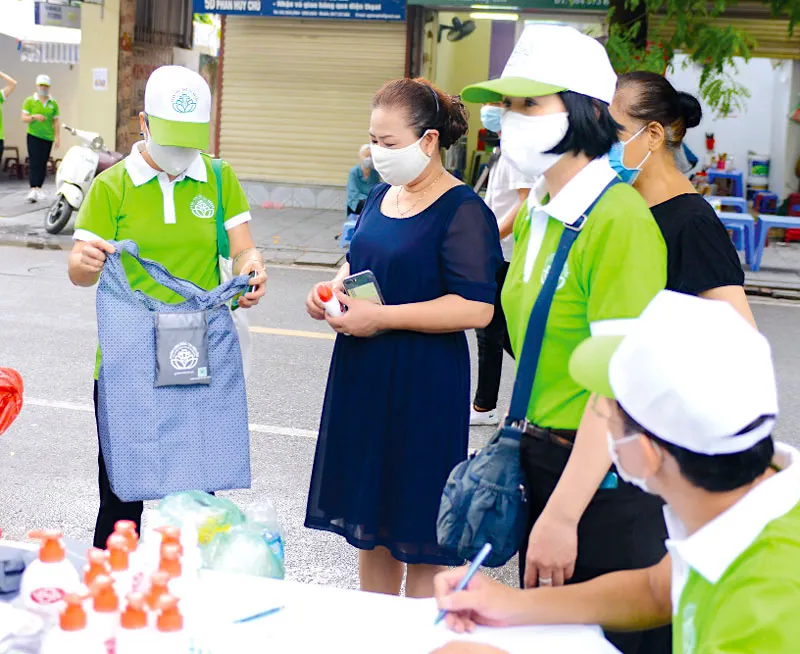Separation of plastic waste challenging Vietnam
Local businesses and consumers are urged to sort plastic waste that is seen as an effective solution for waste treatment.
The collection and separation of plastic waste are the most difficult factor challenging Vietnam's implementation of effective waste treatment solutions. This process, if well implemented, will shorten the waste recycling transition and accelerate the development of the circular economy in Vietnam, local experts have said.
| A resident in Hanoi is hearing about the program "Turn trash into a gift". Photo: Van Nhi |
At the online conference titled “Current status & solutions to plastic waste treatment in Vietnam” held on June 9 in Hanoi, Prof. Dr. Nguyen Huu Dung, General Director of the Vietnam Urban Environment and Industrial Zone Institute, pointed out that the country is facing many related-environment risks from plastic waste when the amount of plastic waste increases rapidly.
According to the Ministry of Natural Resources and Environment (MoNRE), more than three million tons of plastic waste are generated per year, from about 1.8 million tons in 2014 and about two million tons in 2016. Particularly in Hanoi and Ho Chi Minh City, Vietnam’s two biggest cities, about 80 tons of plastic waste and plastic bags are discharged into the environment every day on average.
“Sorting out, recycling, and treatment of plastic waste are still not a widespread practice,” he said.
The amount of plastic waste and single-use plastic bags in Vietnam accounts for about 8-12% of total domestic solid waste. But only about 11-12% of this amount is treated and recycled, the rest is mainly buried, burned, and dumped into the environment, Dung said.
To overcome the problem, many local delegates at the conference said that Vietnam needs a roadmap of technology solutions and investment in the fields of separation at source, reusability, and recycling of plastic waste, in addition to the use of biodegradable materials instead of plastic bags.
Tran Viet Anh, Vice Chairman of the Vietnam Plastic Association cum General Director of Nam Thai Son Plastic Company said that the collection and separation of waste have been currently carried out by local sanitation companies. "Households and businesses are not taking this work seriously."
Meanwhile, many waste recycling businesses are facing a shortage of supply of sorted scrap for production. “I know one firm, which invested in recycling production lines with a capacity of 50 tons a day, had to stop operating due to lack of input materials,” he said.
Participation of businesses & consumers
Vietnam needs to have initiatives to encourage people and businesses to participate in waste collection and separation, such as exchanging scrap for gifts as other countries around the world are doing, Viet Anh said. “There should be activities associated with sustainable urban development in the coming time.”
Pham Van Duc, Deputy General Director of the Hanoi Urban Environment Limited Company (Urenco), said that the company is implementing a project to manage and sort out waste - as a step of moving towards the circular economy.
After six months of piloting the project in Hoan Kiem District from September 21, 2020 to March 30, 2021, they earned positive results. “We will continue to implement the project in four core districts of Hanoi and surrounding areas,” he said.
Nguyen Le Tuan, Director of the MoNRE’s Vietnam Institute of Seas and Islands, said that the policy framework on encouraging the reuse and recycling of solid waste, including plastic waste, has basically been made.
He said the framework will also support the classification of solid waste to make input materials, which will be recycled and consumed in the market at a price basing on the Government's subsidy and encouragement of using recycled products.
However, this policy is still failing to involve private sectors in the collection and treatment of domestic solid waste as well as creating a market large enough to promote the consumption of eco-friendly plastic bags and lure investment.
“Meanwhile, environmental protection tax on non-biodegradable plastic bags is still low, so it has not substantially dealt with the production and use of plastic bags,” Tuan said.











